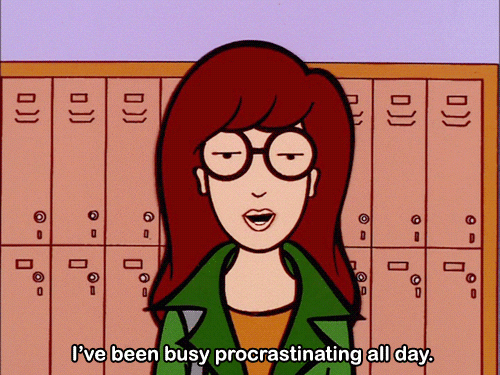7 ways to stop procrastinating at work
You should probably be doing something else right now. But read this first


You should probably be doing something else right now. But read this first
If you're reading this in lieu of finishing that work project you should have completed last week, then you're a procrastinator. But we'll let you off this once because you're doing something about it, right? Just after you've finished re-arranging your Biro collection in order of which one has the most ink left in it.
We're all at it (procrastinating that is, not Kondo-ing our stationary). A new report claims we spend, on average, 218 minutes procrastinating every day. That's 55 days of time lost each year. Not ideal when you have a job to do. A straw poll of the office reveals our favourite time-wasting activities:
'I make a detailed list of all the things I have to do, instead of actually getting on and doing them'
'Last time I had to file my tax return, I distracted myself for a good hour by sending a friend emoji-only texts and asking her to 'guess the film''
'I've been known to eat a whole packet of biscuits instead of cleaning the bathroom because: who wouldn't?'

But we digress. To claim back some valuable time, we asked Niels Eék, psychologist and Co-Founder at personal development and mental wellbeing app Remente how to stop procrastinating at work and manage your time better:
Celebrity news, beauty, fashion advice, and fascinating features, delivered straight to your inbox!
Make the right To Do list If you take an example from everyday life, such as ‘Clean the House’, you may find that you keep putting it off to a later time, even though it is not an overly complicated task. The reason for this is that there isn’t a defined beginning, a plan of action and a concrete end goal in place. Instead, detail which room you want to clean first, which steps you want to take to clean it and where you would like to finish. The same strategy can be applied to work assignments – dividing a task into smaller components will prevent you from procrastinating, as well as making the task ahead of you that much more manageable.
Use the Eisenhower Matrix As you make your To Do list, you will notice that certain things are of higher priority than others and the easiest way to sort them is through the Eisenhower Matrix, that ranks tasks into four categories: Important and Not Urgent, Important and Urgent, Not Important and Not Urgent, and Not Important and Urgent.
Once you’ve done this, assess each section – most of us have a tendency to cram more into the Important and Urgent section than there really needs to be and this section should only be filled with absolute emergencies, such as flights to catch, etc. Important – Not Urgent is a category that you need to carefully prioritise yourself – it might be something important to someone else but not urgent to you. In this case learn how to say no. For example, that you will drop by your colleague’s office when you’ve finished what you are doing and not straight away. Not Urgent but Important is a category that enables us to succeed with our long-term goals and one that shouldn’t be rushed. Lastly, the Not Urgent and Not Important section is one where most tasks can be cancelled or done very quickly, so on a quieter day of the week, have a look at this section and allot it a specific amount of time to be completed.
Work with your deadlines In the same way that it is not constructive to make a vague to-do list, it is equally as distracting when you write an endless list for one day, in the full knowledge that you don’t have time to finish it. Instead, take a look at your deadlines – the daily, weekly, monthly and even yearly. Once you have these in order, fit each task within a deadline bracket, with a clear beginning and finish time. This will help you understand and manage your time better, without feeling flustered or stressed. A good idea is to also only factor in about 80% of your time – that way, should any emergencies crop up, you will have time to deal with them.

Increase efficiency The best way to increase your efficiency is to apply the ‘Pareto Law’. This law finds that by concentrating your efforts on the right things, you will be able to achieve a greater result, for example, 20% of your time will get 80% of the work done. In order to do this, you need to look at your to-do list and identify the areas in which less effort will get the best results. Once you have identified these areas, see how many of them are time-sensitive. If you find that one of the areas doesn’t have a deadline – create one for yourself and work against the clock. Not having a definitive deadline will prolong the amount of time you dedicate to a task, so creating deadlines will increase your efficiency.
Adjust your environment If you find that you have followed all of the above steps but you are still procrastinating, then it could be your working environment. Step away from your desk and try to figure out if it’s making you want to work, relax or even walk away. If it’s the latter two, change things around, making your environment geared towards productive work. It is also worth noting that inspiring working environments can lose their effect after a time, so it is important to change things around every so often.
Eliminate distractions Many of us will have the same go-to distractions, whether it is checking our emails, phones, social media or simply the news websites. The best way to stop doing these things is to eliminate the distractions – switch off your phone, mute your email notifications and block the distracting websites for the time that you need to work.
Re-boot There is nothing more frustrating than having a To Do list that doesn’t get completed, but only added to and then drags on with you through the rest of the afternoon. This is why it’s important to take the time to re-boot around 1 or 2pm. Grab a coffee and reassess your To Do list, moving the priorities around accordingly. You will find that this technique means that you use your afternoon time wisely and don’t procrastinate because you feel overwhelmed by a long list of things that haven’t been done.
